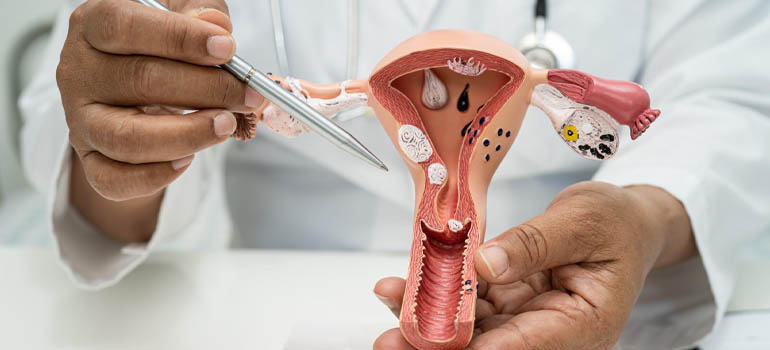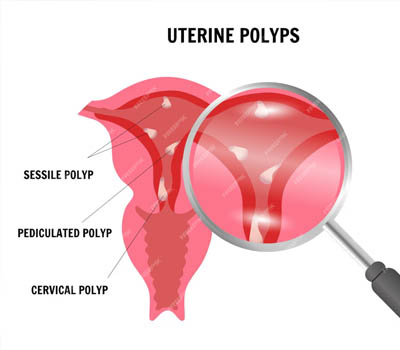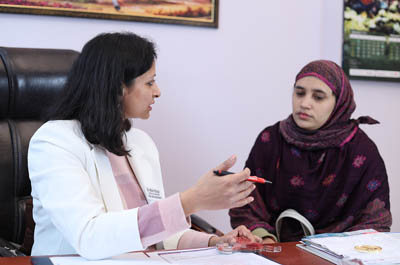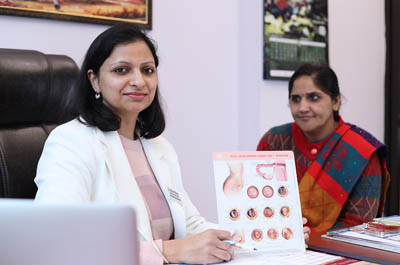
Understanding Uterine Polyps: Diagnosis, Treatment, and Reassurance at Precision Gynaecology with Dr. Neha Poddar
Uterine polyps are small, finger-shaped growths that develop on the inner lining of the uterus (endometrium). While they can cause some women to experience irregular bleeding or other symptoms, many women with uterine polyps have no symptoms at all.
At Precision Gynaecology, Dr. Neha Poddar is dedicated to women's health and offers expert diagnosis, treatment options, and reassurance for women with uterine polyps.
What are Uterine Polyps?
-
Uterine polyps are noncancerous growths that arise from the endometrium.
-
They can vary in size from a sesame seed to very large growths involving whole of the uterine cavity or even outside.
-
Most women have just one polyp, but some may have multiple polyps.

Causes and Risk Factors:
The exact cause of uterine polyps is unknown, but factors that may increase your risk include:
-
Hormonal imbalances, especially high levels of estrogen
-
Obesity
-
Tamoxifen therapy (a medication used to treat breast cancer)
-
Age (more common in perimenopause and postmenopause)
Symptoms of Uterine Polyps:
Some women with uterine polyps experience no symptoms at all. However, possible symptoms can include:
-
Abnormal uterine bleeding, such as heavy periods, prolonged periods, spotting between periods, or bleeding after menopause
-
Pelvic pain or pressure
-
Difficulty getting pregnant
-
Recurrent Miscarriages - uterine polyps if undetected, can be a cause of recurrent miscarriages
Choosing the Right Treatment:
Dr. Poddar will consider various factors when recommending the most suitable treatment for you, such as:
-
Cause of infertility
-
Age and overall health
-
Previous treatment history (if any)
-
Personal preferences
Diagnosis:
Dr. Poddar can diagnose uterine polyps through various methods, including:
-
Pelvic exam
-
Ultrasound scan
-
Hysteroscopy (a thin, lighted scope inserted through the vagina to view the inside of the uterus)
Treatment Options:
Not all uterine polyps require treatment. However, if you're experiencing symptoms or have a polyp that is large or rapidly growing, Dr. Poddar may recommend treatment options such as:
-
Polypectomy: This is a minimally invasive procedure to remove the polyp(s) using a hysteroscope.
-
Hysterectomy (removal of the uterus): This is usually only considered in severe cases or if other treatments are not suitable.


Reassurance and Next Steps:
Dr. Poddar understands that a diagnosis of uterine polyps can cause concern. Here at Precision Gynaecology, she will provide reassurance and discuss your individual situation.
In most cases, uterine polyps are benign (not cancerous). Dr. Poddar will develop a personalized treatment plan based on your specific needs and ensure you receive the best possible care.
Remember, early detection is key. If you're experiencing abnormal uterine bleeding or other symptoms, schedule an appointment with Dr. Neha Poddar at Precision Gynaecology. She can diagnose uterine polyps and recommend the most appropriate course of action for you.
FAQS
Uterine polyps are growths that develop in the lining of the uterus (endometrium). These polyps are usually noncancerous (benign) and vary in size, ranging from a few millimeters to several centimeters. While uterine polyps may not always cause symptoms, they can lead to abnormal uterine bleeding, infertility, or recurrent miscarriages. Dr. Neha Poddar at Precision Gynaecology specializes in diagnosing and treating uterine polyps to help women achieve optimal uterine health.
The exact cause of uterine polyps is not always clear, but they are thought to develop due to an overgrowth of cells in the endometrium. Hormonal imbalances, especially estrogen dominance, may contribute to the formation of uterine polyps. Other risk factors include obesity, certain medications, and prior history of uterine inflammation or cancer. Dr. Neha Poddar can provide individualized assessments to determine the underlying cause of uterine polyps and recommend appropriate treatment options at Precision Gynaecology.
Symptoms of uterine polyps may include irregular menstrual bleeding (such as heavy or prolonged periods), bleeding between periods, infertility, or recurrent miscarriages. Some women may also experience pelvic pain or pressure. However, some women with uterine polyps may not experience any symptoms at all. If you suspect you may have uterine polyps or are experiencing abnormal uterine bleeding, it's important to consult with Dr. Neha Poddar for evaluation and management at Precision Gynaecology.
Treatment for uterine polyps depends on various factors such as the size of the polyps, severity of symptoms, and whether fertility is a concern. In many cases, small asymptomatic polyps may not require treatment. However, if uterine polyps are causing symptoms or affecting fertility, Dr. Neha Poddar may recommend procedures such as hysteroscopy to remove the polyps. Hormonal medications or oral contraceptives may also be prescribed to help prevent the recurrence of uterine polyps. At Precision Gynaecology, Dr. Poddar provides personalized treatment plans tailored to each patient's needs and goals.
- General Gynae
- Menstrual Disorders
- Vaginal discharge
- Cervical Cancer - Screening & Vaccination
- Pelvic inflammatory disease (PID)
- Infertility treatment (IVF & IUI)
- Uterine polyps
- Septate Uterus (Uterine Septum)
- Uterine Fibroids
- Ovarian Cysts
- Dermoid Cysts
- Ectopic Pregnancy
- Endometriosis
- Menopause
- Hormonal Disorders
- PCOS and Hyperprolactinemia
- Gynae Endoscopy
- Uro Gynae
Are you seeking a qualified and experienced gynecologist and obstetrician in Ghaziabad? Look no further than Dr. Neha Poddar!
- Call 9318413696, 9958170476
- Whatsapp 9318413696

Doctors
-

Dr. Madhu Poddar
-

Dr. R.K. Poddar
-

Dr. Neha Poddar
-

Dr. Rahul Poddar